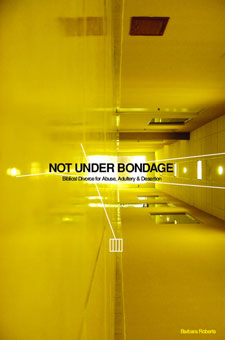Barbara Roberts’ book is intimately connected with her own story. She herself is the survivor of an abusive marriage, which she finally left after 10 years. Like all Christians who experience a failed marriage, she spent much time struggling with what the Bible teaches about divorce.
This book is a result of her research during this time. That immediately sets off alarm bells " perhaps she is too close to the subject to be objective. It’s a reasonable concern, so it’s comforting to see back-cover endorsements from people like Michael Hill and David Clyde Jones.
 Roberts helpfully includes a list of the book’s “key concepts” on the first page. Her basic thesis is that the Bible distinguishes between “treacherous divorce” and “disciplinary divorce”. Treacherous divorce is condemned, but disciplinary divorce is permitted in instances of abuse, adultery and desertion.
Roberts helpfully includes a list of the book’s “key concepts” on the first page. Her basic thesis is that the Bible distinguishes between “treacherous divorce” and “disciplinary divorce”. Treacherous divorce is condemned, but disciplinary divorce is permitted in instances of abuse, adultery and desertion.
The opening chapter discusses of the nature of domestic abuse. Roberts defines abuse more broadly than just violence " it can include psychological, emotional and sexual elements, as well as others. The chapter was helpful, but was perhaps a little short given the importance of the subject.
The bulk of the book is spent defending the aforementioned thesis by a careful consideration of the relevant biblical material, from both the Old and New Testaments. Roberts’ own position on Scripture is that it is “" inspired, without error and fully sufficient to guide us in all matters of life and practice.” It is clear from the book that she also respects biblical gender roles.
Her main conclusion is that the victims of domestic abuse have a scriptural warrant to divorce their spouses, as do the victims of adultery and desertion. Not everyone will be persuaded by all points of her exegesis, but she presents detailed arguments that deserve close attention. The appendices contain an interesting collection of extra-biblical material on the subject.
Domestic abuse is an issue that many pastors will have to deal with during their career. Some pastoral responses in the past have been poor, and have left vulnerable people in appalling situations. The command to love means that immediate action should always be taken to protect the victims of abuse. But what the next step should be is often less clear. Roberts’ book will be helpful to those who are attempting to work through these very difficult issues in a biblical and God-honouring manner.



















